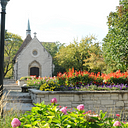Global Jesuits open up about possibility: Jose Miguel Jaramillo
Mission Week Feature Series
Country of Origin: Ecuador
Marquette Ministry Focus
I am a Jesuit graduate student pursuing a Ph. D. in education policy and leadership. That is my main mission. I am a Jesuit in residence in Schroeder Hall, and what that means is being here open and available to help minister students on demand. Since before moving into the Hall, I’ve been celebrating weekly masses for Campus Ministry. Also, I help at St. Patrick’s and Our Lady Guadalupe parishes regularly.
Which ministry is prioritized in your home country?
By numbers, education is the Jesuits’ most significant work in Ecuador. We have a national university with campuses in different cities called Pontificia Universidad de Católica del Ecuador (PUCE). Then we have six traditional Jesuit schools that are K-12. And we have more than 70 schools in Fe y Alegría, a network that helps under-served populations and those in lower social-economic status. After the government, the Jesuits have the largest education system in the country. Additionally, we have three parishes. I was the co-pastor in one of them in the mountains of Guamote and ministry mostly indigenous people. We also have several places for social assistance and human development. To say something, Hogar the Cristo assists people in getting basic housing and health services, and it offers loans and legal aid for migrants. Fundación Río Manta helps women who suffer intra-violence, a common problem with those living in areas of extreme poverty. Jesuits in Ecuador primarily focus on education, parishes, social work, and communications.
How has the Society’s international focus changed your mind to what is possible?
For me, the Jesuits being an international organization was clear from the beginning. We insist that when someone becomes a Jesuit, the person enters a province, but he belongs to the Society of Jesus as a universal institution. In my case, that universality became a reality early on because I did my novitiate in Quito and then worked-studied in Peru, Chile, and now, here I am at Marquette. This international dimension of the Order and the exposure to the local needs ended up moving me to study education. From the beginning, I was very interested in working in social development. Knowing different countries and realities, you can expand your notions of what is possible and what needs to be done. For example, in Chile, I worked at INFOCAP, the “Worker’s University,” a training center for people who mostly did not finish high school. Their educational program works in such a way that it develops people’s skills and offers healing experiences. That changes many lives. And it expanded my knowledge about what is possible and necessary from education beyond formal schooling: to help people live better and make a living.
How has being open to possible changes shifted the focus of your ministry?
When I entered the Society of Jesus, I always wanted to work with the population in poverty, but then I was exposed more and more to education. Even after my ordination when we were exploring possibilities through a graduate degree in economics and politics, my provincial came and said, “our main ministry here is education” and he asked me to move away from social work and prepare myself to work in education. That is what brought me to Marquette. That’s a change from assisting in social failure situations to preventing them through education. I’m still trying to help people engage in better relationships and live with more justice, but now through education. My concern is how do we provide a type of education that is not correlated with how much you pay for it, i.e., how any person who attends a Jesuit school can receive a similar core quality education?
For more on Marquette Mission Week visit, www.marquette.edu/mission-week
